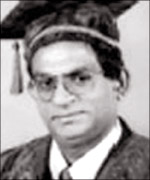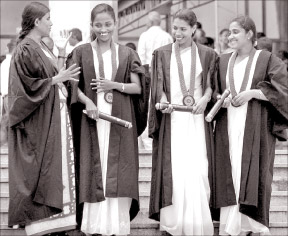‘Make universities strategic partners in development’
Text of Address
by Professor Ranjith Senaratne, Vice Chairman, University Grants
Commission at the convocation of the University of Sri Jayewardenepura,
held at the BMICH on February 5, 2012, titled ‘Let us make our
universities a strategic partner and a catalyst of regional and national
development’
In Sri Lanka there are 15 universities with an academic strength of
around 4,500, including about 500 Professors and Associate Professors
and over 1,750 Senior Lecturers with PhDs or equivalent qualifications.
An appreciable number of these senior academics are promising scientists
with international experience and make a significant contribution to the
advancement and dissemination of knowledge in their respective fields.
According to a study conducted by the National Science Foundation in
2004, the academics in the universities have accounted for more than 60
percent of the R&D personnel in the country.
In addition, there are over 60,000 undergraduates and over 4,000
post-graduate students in our universities who are pursuing studies in a
multitude of faculties such as Engineering, Medicine, Dentistry,
Veterinary Science, Natural Science, Agriculture, Humanities, Social
Science, Management and Law. Only about 2 percent of the students
receiving school education in our country have the privilege of entering
university. Thus these students undoubtedly constitute the distilled
spirit of the youths of the country.
|

Professor Ranjith Senaratne |
Higher education
Presently, a sum exceeding Rs 20,000 million or Rs 20 billion is
spent annually on higher education in our country. To produce a
graduate, the government expends typically around Rs. 500,000, or more,
depending on the degree programme, university etc. In addition, to
provide school education from Year 1-13, though we call it ‘free’
education, a substantial amount of public funds is spent.
As the Nobel Laureate Milton Friedman said “There is no such thing as
a free lunch”, and somebody is paying for it. In regard to education, it
is supported by the sweat, toil and labour of the common man. Therefore
it is incumbent upon the university community including its students to
cultivate a deep sense of civic consciousness and reciprocate by
providing a tangible service to the community and society. With at least
one university being situated in each province, universities are in a
unique position to become true and effective partners in national
development by mobilizing and channelling their rich intellectual and
infrastructure resources for regional development.
Engagement with community
In societies where universities are public institutions, serving the
public interest through outreach activities in legitimate and necessary.
Government in many parts of the world are now pushing public funded
universities for ‘value money’. Industry and the world of work look for
skilled graduates, while society and the community desire thoughtful and
knowledgeable leadership and reflective professional support from
graduates. Various stakeholders demand skills, knowledge and the ability
to apply what is learned to the good of the society and themselves. To
meet such demands, universities should be fully and explicitly engaged,
not only in teaching and research partnerships, but also in outreach
activities to meet society's intellectual, social, economic,
environmental, spiritual and cultural needs.
In Sri Lanka, a substantial proportion of the population is still
living in rural areas without basic amenities and services. There exist
a wealth of dormant forces, faculties and talents in rural areas which
need to be harnessed and channelled for rural development. As Dr. Abdul
Kalam said, young minds that have been ignited are the most powerful
resource. This resource is mightier than any other resource on earth, in
the sky and under the sea. The 20 million minds of our nation are indeed
a great power waiting to be tapped!
|

Job aspirants - higher education courses should be job-oriented |
There are many youths in rural areas bubbling with creativity and
enthusiasm. Their trapped energies and suppressed initiatives need to be
liberated and harnessed. Only a burning candle can light another candle.
What a great responsibility and a moral obligation the intellectuals and
professionals of this country have in this crucial hour to ignite the
dormant inner energy of the youths in rural areas and guide this
tremendous energy in a constructive manner for nation building! Any
attempt to make Sri Lanka a developed country should address these in
the rural sector, empowering its people. Rural development is an
essential need for transforming Sri Lanka into a knowledge economy.
Acceptable solutions
Therefore it is imperative for universities and higher education
institutions to be actively involved with the society of which they are
part. It is time that universities embrace engagement with wider society
not as an adjunct to, but as a sine qua non of, their central purposes.
Hence engagement should be considered as a ‘core value’ for the
university, which can no longer keep aloof from society. Universities
need to get to the bottom of issues faced by society and community
concerning livelihood, disease, poverty, illiteracy, agriculture,
industry, productivity, education, environment etc. and find acceptable
solutions to them.
In order to achieve this, the engagement must embrace a great deal
more than just ‘links’ to the ‘outside world’. It should be a truly
organic relationship, like that between mother and child or husband and
wife.
Active dialogue
Here, our scientists should become civic scientists and contribute
towards societal transformation. In this new capacity, scientists should
step beyond their campuses, laboratories and institutes and move into
the centre of their communities to engage in active dialogue and action
with their fellow citizens. They should ask themselves the question of
how their knowledge can make an impact on the common man's life. Our
academics should become fearlessly people-friendly, have a positive
attitude and provide a responsive and proactive service to the people.
In other words, they should become practical academics or ‘pracademics’.
The Sagara Wishva Vidyalaya, established by the President when he was
the Minister of Fisheries and Aquatic Resources, is based on the
philosophy that it should cater to the trained manpower needs of the
fisheries and allied sectors and help those engaged in these sectors to
improve their living standards and social status. Thus serving the
fisheries community, industry and other related stakeholders are clearly
embedded in its mission and prominently reflected in its academic and
vocational courses.
To be continued |



